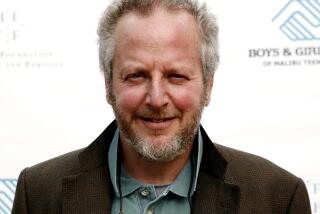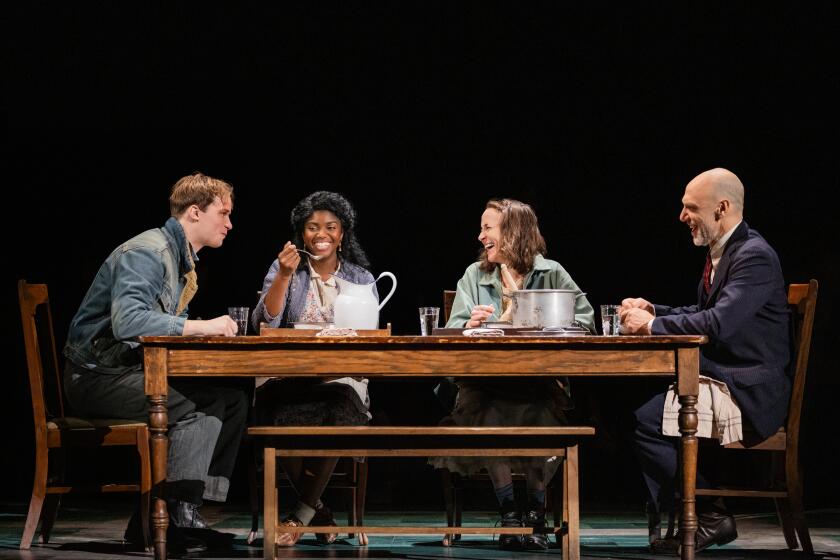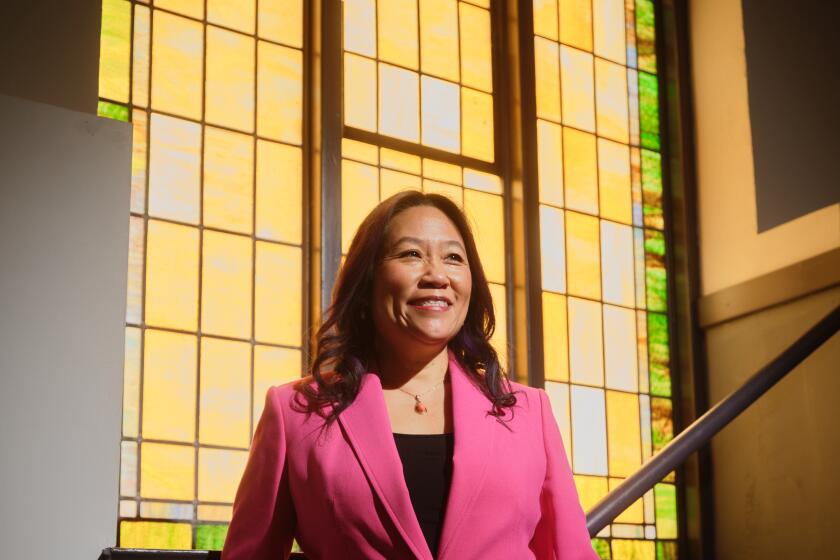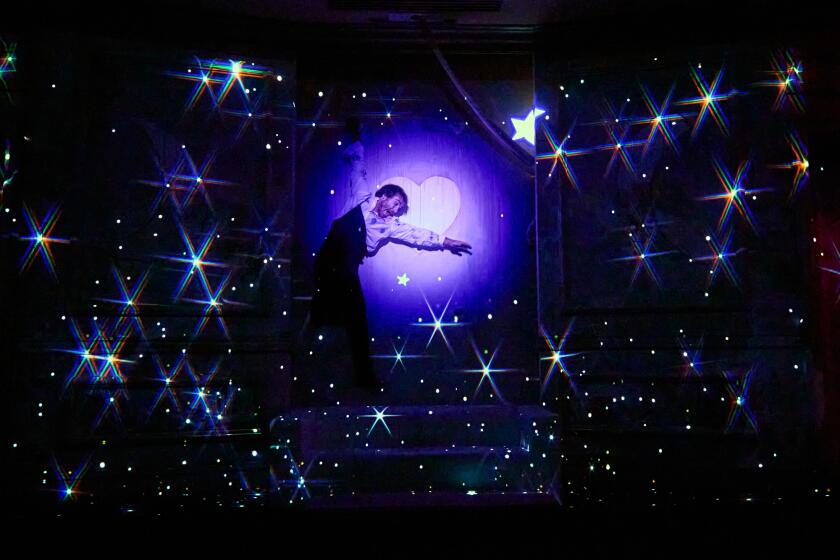‘Boy, I’ve Had Some Swift Life’
March 12, 1946: Born Liza May Minnelli, in Hollywood, first child of director Vincente Minnelli and Judy Garland. Godparents are Ira Gershwin and Kay Thompson.
1949: Makes film debut at age 3 in her mother’s musical “In the Good Old Summertime.”
1951: Garland and Minnelli are divorced, and she marries producer Sid Luft the same year. Liza, then 5, eventually becomes half sister to Lorna and Joey Luft.
February 1952: Not yet 6, Liza makes her stage debut, dancing to her mother singing “Swanee” in Garland’s sensational concert at the New York Palace Theatre.
1959: Liza, 13, appears on a Gene Kelly television special. They sing “For Me and My Gal.”
1960: Attends the Broadway musical “Bye Bye Birdie” in New York, and her ambition crystallizes to be a stage performer.
1961: Tours Israel, Athens and Rome in the title role of “The Diary of Anne Frank,” a Scarsdale High School drama club production.
April 2, 1963: Makes New York stage debut in an off-Broadway revival of the 1941 musical “Best Foot Forward,” playing a scrappy tomboy.
1964: Records first album--”Liza! Liza!”--for Capitol Records. Meets John Kander and Fred Ebb while seeking new material for the album. They play her songs from a new Broadway show they are writing called “Flora, the Red Menace.”
Nov. 8, 1964: Appears with Garland at the London Palladium in a concert taped for television and records. Opening the show are the Allen Brothers, a singing-dancing duo (not related) whom Garland had discovered earlier that year and introduced to Liza. The comical Peter Allen becomes a favorite of both Garland and Minnelli, who begins living with him.
March 11, 1965: Minnelli makes her Broadway debut in “Flora, the Red Menace” at the Alvin Theatre, playing a young woman whose boyfriend is a communist. The show closes after 87 performances, but she wins the Tony Award as the best musical actress.
September 1965: Makes her cabaret debut at the Shoreham Hotel’s Blue Room in Washington, in an act written by Fred Ebb. Later that year Charles Aznavour presents her at the Olympia in Paris, telling the audience, “I’ve brought you a present from America.” She is later awarded the Legion of Honor by the French government.
1967: She marries Peter Allen, the first of her three husbands. The union ends in divorce in 1974. Later that year she weds Jack Haley Jr.; they are divorced in 1978. She marries sculptor and producer Mark Gero on Dec. 4, 1979; they divorce in 1991.
1969: Stars as eccentric Pookie Adams in “The Sterile Cuckoo,” directed by Alan Pakula. Nominated for an Oscar.
June 22, 1969: Judy Garland dies of a drug overdose in London. Minnelli organizes funeral arrangements.
1970: Minnelli stars for director Otto Preminger in “Tell Me That You Love Me, Junie Moon.”
February 1972: The film musical “Cabaret” is released. Minnelli wins the Golden Globe, the Oscar, the English Academy Award and other honors for her role as Sally Bowles in decadent 1930s Berlin. By the end of the year, NBC airs “Liza With a Z,” which earns her an Emmy.
January 1974: “Liza” opens at the Winter Garden Theatre on Broadway. She wins a special Tony for the concert.
August 1975:
Takes over for an ailing Gwen Verdon in the Kander & Ebb musical “Chicago,” marking the first time a star of this magnitude is a replacement in a Broadway show. Ticket sales skyrocket.
1975: Stars in “Lucky Lady,” directed by Stanley Donen, as a tough-talking moll. The film, with Burt Reynolds and Gene Hackman, tanks at the box office.
1976: Minnelli stars for her father in “A Matter of Time.” She plays a chambermaid turned courtesan; the film fails at the box office.
June 1977: Stars opposite Robert De Niro in “New York, New York,” a film about the 1940s pop music scene. The film, also a box-office disappointment, is directed by Martin Scorsese, with whom Minnelli is having an affair.
Oct. 29, 1977: Kander & Ebb’s musical “The Act,” about a former movie star making a comeback, opens on Broadway. The director of record is Scorsese, but the show has such a troubled tryout that Gower Champion is brought in to salvage it. Despite poor notices, the show runs and Minnelli wins her third Tony.
Sept. 5, 1979: Makes Carnegie Hall debut in an 11-night engagement, making it the longest-running solo show in the history of the hall. In 1987, she breaks her own record with 17 shows.
1981: Stars opposite Dudley Moore in “Arthur,” which grosses nearly $80 million.
July 15, 1984: Checks into Betty Ford Clinic in Rancho Mirage for seven weeks, acknowledging alcohol and drug addiction.
June 1985: Stars in an international “comeback concert.” Changes lyrics in the song “Cabaret” about a hard-drinking, pill-popping friend from “When I go, I’m going like Elsie” to “When I go, I’m not going like Elsie.”
October 1985: Stars as the mother of a terminally ill son in “A Time to Live” on NBC. Wins second Golden Globe.
July 25, 1986: Vincente Minnelli dies. A year later, she acts as narrator and host of a television special, “Minnelli on Minnelli,” a tribute to her father’s work.
1989: Releases new album, “Results,” co-produced by Neil Tennant of the Pet Shop Boys. One of the cuts, Stephen Sondheim’s “Losing My Mind,” becomes a pop hit in Europe.
1989: Steps in for an ailing Dean Martin and joins Sammy Davis Jr. and Frank Sinatra in what was to be a Rat Pack reunion tour.
1990-91: Makes film of “Stepping Out,” adapted by Richard Harris from his play about a group of women who gain self-esteem through dance classes. Caught in a transfer of power at Paramount, the film isn’t released until a year later and does poor business despite good reviews. She begins a tour of a musical revue, “Stepping Out,” based on the film’s concept. The show opens at Radio City Music Hall, and Sony releases an album and video.
June 18, 1992: Peter Allen dies of complications of AIDS.
December 1994: After appearing at Radio City once again, Minnelli has hip-replacement surgery. The following May, she returns to the concert stage with an international tour.
June 1995: Records gay-liberation anthem “The Day After That” in conjunction with the 25th anniversary of the Stonewall riots, which began the day her mother was buried. The record benefits AIDS organizations.
March 12, 1996: Charles Aznavour hosts a 50th-birthday party for Minnelli at Fouquet’s on the Champs Elysees in Paris.
Fall 1996: “Gently,” an album of soft, jazzy ballads, is released by Angel Records; it is later nominated for a Grammy.
Jan. 8, 1997: Steps in for Julie Andrews in the Broadway musical “Victor/Victoria” and breaks box-office records despite reports that she arrives unprepared and flubs lines; co-star Tony Roberts stages sickout.
February 1997: Has operation to remove polyp on vocal cords.
More to Read
The biggest entertainment stories
Get our big stories about Hollywood, film, television, music, arts, culture and more right in your inbox as soon as they publish.
You may occasionally receive promotional content from the Los Angeles Times.






